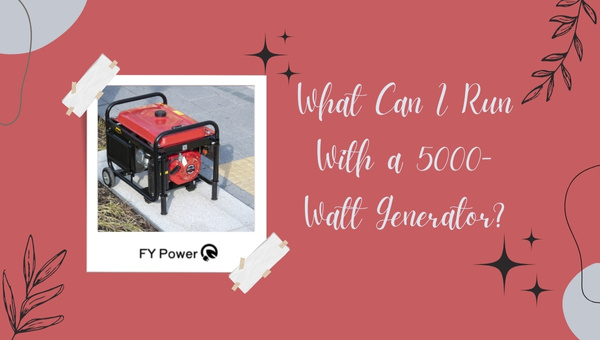The inverter generator has become a popular choice when it comes to finding the right generator for emergencies, camping trips, or other off-grid tasks. But what exactly is an inverter generator, and how does it work? Inverter generators combine innovative technology and resourceful design to provide a more efficient and reliable source of power than traditional generators.
In comparison to conventional generators, which produce a raw form of electrical power called alternating current (AC), inverter generators use advanced technology to convert AC to direct current (DC) and then back to a more stable, clean form of AC power. This process results in a continuous flow of eco-friendly and safe power with sensitive electronic devices, such as laptops and smartphones.
However, as with any technology, there are pros and cons to using an inverter generator. Some of the key advantages include their lightweight design, portability, fuel efficiency, and quieter operation. On the other hand, the drawbacks involve their higher upfront cost, limited power output, and potential for maintenance and repairs.
In the end, weighing the benefits and downsides of an inverter generator will help determine if it’s the right power source for your particular needs. Read on to learn more.
What is an inverter generator?
An inverter generator is a type of portable generator that provides AC power. It takes in AC power, converts it to DC power, and then gives back the AC power with less Total Harmonic Distortion (THD).
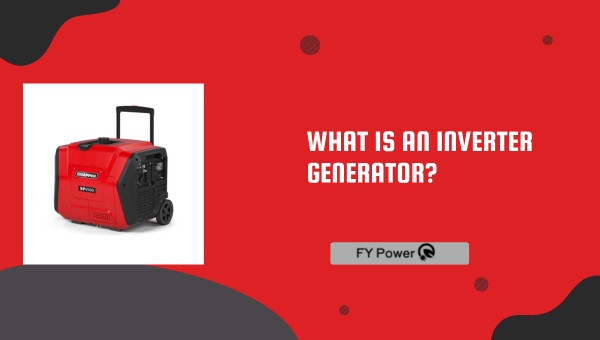
This makes the generator more efficient and quieter than traditional fuel-powered generators. Inverter generators are also more fuel efficient, as they can adjust their engine speed to match the load requirement. This allows for smaller fuel tanks and longer run times.
Inverter generators come in a variety of sizes and can be used for a variety of applications, from powering small appliances during an outage to providing backup power for RV trips.
When choosing an inverter generator, it’s important to consider the size of your needs and the wattage requirements of your appliances. Additionally, you should ensure that the inverter generator is properly maintained by following manufacturer instructions and performing regular maintenance checks.
How does an inverter generator work?
An inverter generator functions by using a multistep process to convert electrical energy from one to another. First, an inverter generator uses a fuel-powered engine to spin a rotor, which creates a magnetic field within the generator.
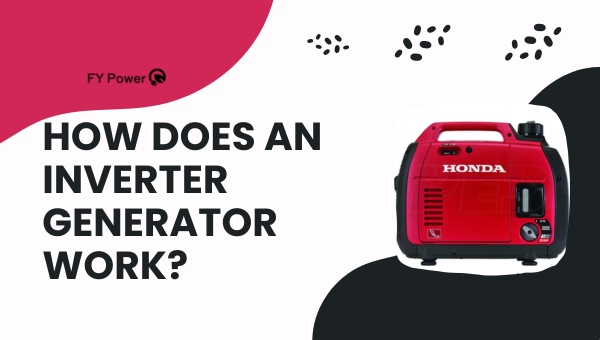
As the magnetic field rotates around a stator with copper wire windings, an electrical current is generated that flows in one direction. Here are the main points about how an inverter generator works.
- The inverter generator uses a rectifier to convert the AC power into DC power.
- Next, the DC power is passed through an electronic inverter, resulting in a clean and stable current.
- The DC electricity is then passed through an inverter, which converts it back into clean AC electricity, with a stable voltage and frequency.
- This clean AC electricity can be used to power appliances, tools, and other electrical items safely and efficiently.
- Inverter generators are more fuel efficient than traditional fuel-powered generators, as they only use the amount of fuel needed to generate the required amount of energy needed at any given time.
- They also produce less noise than conventional generators, as their engines run at variable speeds depending on the load being placed on them.
- Inverter generators also produce less total harmonic distortion (THD) than traditional generators, making them safer for sensitive electronics like computers and TVs.
Types of inverter generator
There are two main types of inverter generators.
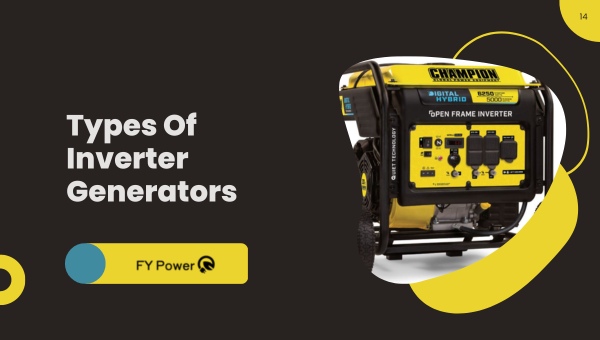
Portable Inverter Generator: These are designed to be portable and are typically quite small and lightweight. These generators generally run on gasoline or diesel and are perfect for camping, tailgating, RVing, or as a backup during power outages.
Standby Inverter Generator: Standby inverter generators are larger and can only be used with natural gas or liquid propane. They’re usually installed outdoors near the home and provide an alternative source of power in case of emergency.
What to Consider When Purchasing an Inverter Generator?
When looking for an inverter generator, keeping some key points in mind is crucial. I’ll walk you through a few important factors that’ll make your decision-making process easier and ensure you’re getting the right device for your needs.
Power Output
The first thing to consider is the power output of the generator. You’ll want to make sure it’s sufficient for the devices you plan to power. Inverter generators usually range from 1000 watts to 4000 watts. Keep these rough estimates in mind when thinking about your needs:
- 1000-2000 watts: Ideal for small appliances, laptops, and phone chargers
- 2000-3000 watts: Suitable for more demanding devices like an RV air conditioner, refrigerator, or power tools
- 3000-4000 watts: Perfect for larger devices, multiple heavy-duty tools, or powering an entire small-sized house
Fuel Efficiency and Runtime
It’s also essential to take into account a generator’s fuel efficiency and runtime. Inverter generators are known for their excellent fuel efficiency, which means they can run for longer periods on a single tank of gas.
Look for models that feature Eco-Throttle or Smart-Throttle systems that automatically adjust engine speed, resulting in both improved fuel consumption and quieter operation.
Noise Level
Noise levels can vary between different models, so be mindful of this when making a selection. Residential areas might have strict noise regulations, so choosing an inverter generator that operates below certain decibel (dB) limits is vital. Here’s a rough guideline for noise levels:
- 50-60 dB: Comparable to a refrigerator or air conditioner
- 60-70 dB: Similar to conversation or background music
- 70-80 dB: Comparable to a lawn mower or vacuum cleaner
Portability and Size
Inverter generators are known for their compact size and ease of transportation. Look for models with built-in handles or wheels for even greater portability. The weight of the device can also impact portability, so make sure to check for that specification in the product details.
Price and Warranty
Lastly, it’s important to consider the price and warranty of the inverter generator. Although these devices can be pricier than traditional generators, the benefits often outweigh the costs. Make sure to compare prices and features between different models, and opt for those that offer a solid warranty for extra peace of mind.
By considering these factors when purchasing an inverter generator, you’ll be better equipped to make an informed decision that meets your specific needs.
Inverter Generator vs. Conventional Generator
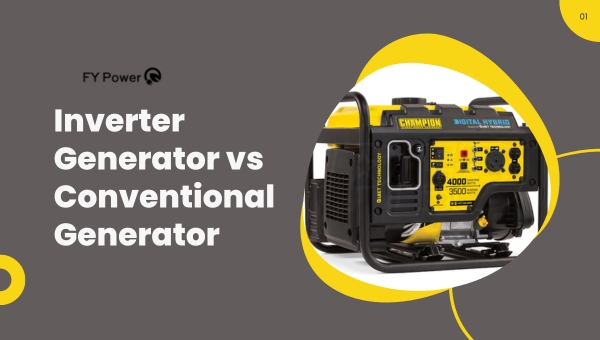
In this section, I’ll dive into the differences between inverter generators and conventional generators, highlighting their pros and cons. Choosing the right generator depends on various factors like power requirements, budget, and portability.
Inverter Generators are known for their efficiency, quiet operation, and portability. They convert DC power to AC power using advanced electronic circuitry.
Here’s a side-by-side comparison highlighting the key differences:
| Specs | Inverter Generator | Conventional Generator |
|---|---|---|
| Efficiency | High efficiency | Less efficient |
| Noise level | Quiet | Noisy |
| Power quality | Clean output | Less stable output |
| Size and portability | Compact and lightweight | Bulkier and heavier |
| Cost | Higher upfront cost | Lower initial cost |
| Power output | Limited power output | Greater power output |
After considering these differences, it’s crucial to evaluate your specific needs before deciding on the type of generator that will best suit your requirements.
Top 5 inverter generators
1. Honda EU2200I: This is one of the best inverter generators on the market, offering quiet operation and reliable power output in a compact and lightweight package.
2. Yamaha EF2000IS: This generator is ideal for camping, tailgating, or powering small electronics and appliances during a power outage. It has a designed noise level of 51dB at 25 percent load and is fuel-efficient when running continuously with its Smart Throttle technology.
3. Champion 3400W Dual Fuel Inverter Generator: This unit can run either natural gas or gasoline, making it versatile enough to meet different needs. It’s also equipped with a start type of Recoil, Electric technology.
4. WEN56200I Super Quiet 2000-Watt Inverter Generator: This is a budget-friendly option that’s perfect for RVs and camping trips. It has built-in overload protection to help protect your devices in case of an unexpected power surge.
5. Westinghouse iGen4500DF Dual Fuel Inverter Generator: This unit can run on either gasoline or propane, making it versatile and reliable during emergencies. It also has an electric start, so you don’t have to worry about having to pull-start the engine in case of a power outage.
Pros of inverter generator
Inverter generators offer several pros over traditional generators. Here are some of the key benefits.
- Quieter operation: Inverter generators are much quieter than traditional generators, making them ideal for camping and other outdoor activities.
- Fuel efficiency: Inverter generators use less fuel than conventional fuel-powered generators, making them more cost-effective in the long run.
- Cleaner power output: The precision of inverter technology ensures that its power is closer to “line power” than any other generator design. This means that it produces cleaner, more reliable electricity.
- Portable: The Inverter generators are lightweight and compact, they are easy to transport and store.
Cons of inverter generator
Inverter generators are becoming increasingly popular, but there are some cons to consider before investing in one. Here are the main cons of inverter generators.
- Cost: Inverter generators are more costly than conventional portable generators.
- Lower Power Output: Inverter generators typically have lower power output than conventional portable generators.
- Costly Repairs: Because of their complexity, repairs for inverter generators can be expensive.
- Not Available in Large Sizes: Inverter generators are not available in large sizes, so they may not be suitable for powering large appliances or tools.
- Complicated Design: The design of inverter generators is more complicated than that of conventional portable generators, making them harder to maintain and repair.
Safety Considerations When Using an Inverter Generator
Given below are some safety considerations when using an Inverter Generator.
- Never use or run a generator in an enclosed space or indoors.
- You should be aware of the possible hazards related to portable generators, such as their production of carbon monoxide (CO).
- Avoid electric shock or electrocution and fire by using the generator outdoors, more than 20 feet away from doors, windows, vents, and other building openings.
- Don’t refuel the generator while it’s running or when the engine is hot.
- Don’t overfill the fuel tank.
- Don’t put anything flammable near the generator.
- It’s dangerous to operate a portable or inverter generator while raining, snowing, or in wet conditions.
- Follow manufacturer instructions for the proper use and maintenance of your generator
- Be aware that some inverter models require special cords, so make sure you have the right one.
- Always unplug appliances from the generator before turning it off. Check to make sure the generator is connected properly and securely and that all electrical connections are tight.
- Never touch any live parts on the generator when checking for a short circuit.
By following these safety precautions, you will be able to ensure your inverter generator’s safe and efficient operation.
Common Problems with Inverters generator and Their Solutions
Inverter generators have numerous benefits over traditional generators, but they also have some common problems that users should be aware of. Here are some of the most common problems with inverter generators along with their solutions.
1. Overloading
Inverter generators are designed to provide a specific amount of power. If you try to run too many appliances at once, you can overload the generator and trip the circuit breaker. This can cause your inverter generator to shut down unexpectedly. To avoid overloading, you should only connect appliances that require less power than your inverter generator can provide.
2. Fuel Problems
Inverter generators require fresh fuel to operate properly. If you leave old fuel in the tank, it can lead to problems like hard starting, poor performance, and even engine damage. To avoid fuel-related problems, you should always use fresh fuel and empty the fuel tank when you are done using your generator.
3. Battery Problems
Inverter generators that have electric starters rely on a battery to start the engine. If the battery is dead or not charged, your inverter generator won’t start. To avoid battery problems, you should keep your battery charged by running your generator for a few hours every few months or installing a battery maintainer.
4. Low oil shutdown issues
Inverter generators have a low oil shutdown that will shut off the engine if the oil level is too low. However, this feature can sometimes malfunction and shut off the engine even when the oil level is not low. To avoid low oil shutdown issues, you should regularly check the oil level and change the oil according to the manufacturer’s recommendations.
5. Spark plug problems
Spark plugs are essential components of inverter generators. They can sometimes get fouled or corroded, which can cause your generator to start hard or not at all. To avoid spark plug problems, you should replace your spark plug according to the manufacturer’s recommendations and keep your generator clean.
In summary, inverter generators are reliable and efficient sources of power, but like any appliance, they can develop problems from time to time. By following the above solutions, you can quickly identify and fix the most common problems with inverter generators and ensure their safe and efficient operation.
Tips for Maintaining an Inverter Generator
- Regularly check the oil level: Checking the oil level is important to ensure that your generator is running properly and efficiently. It also helps to prevent engine damage due to low oil levels.
- Change the Oil According to Manufacturer Specifications: Changing the oil regularly keeps your generator in top shape, so make sure you follow the manufacturer’s specifications for how often it should be done.
- Keep Your Generator Clean: Dirt and debris can block air intakes, causing your generator to run inefficiently or not at all. To keep your generator clean and running smoothly, use compressed air or a damp cloth to remove any dirt or dust from its exterior surfaces on a regular basis
- Clean the air filter – Cleaning and replacing air filters will help keep your generator running smoothly and efficiently.
- Check fuel levels – Make sure you always have enough fuel on hand for your generator, as running it out of fuel can cause damage to its engine.
- Use Fresh Fuel: Old fuel can cause problems like hard starting, poor performance, and even engine damage in inverter generators, so make sure you always use fresh fuel when filling up your tank.
- Check Battery Status Regularly: Inverter generators with electric starters rely on a battery in order for them to start up properly – if this battery isn’t charged, then you won’t be able to get any power out of it! Make sure you’re checking its level regularly (every few months) and charging it as necessary.
- Don’t Overload the Generator: Generators can only handle so much power, and if you exceed that, then you’ll trip the circuit breaker and possibly damage the generator. Make sure you only connect appliances that require less power than your inverter generator can provide.
- Follow the Manufacturer’s Maintenance Schedule: To ensure that your generator runs efficiently and effectively for a long time, make sure to follow the manufacturer’s maintenance schedule. This includes checking and changing the oil, spark plugs, and air filter, as well as other components.
- Store Properly: Make sure you store your generator in a dry and flat area without exposure to extreme temperatures. This will help keep it in good condition and ensure it is ready to go when you need it!
Following these tips will help you maintain your inverter generator and keep it running efficiently for years to come. And remember, always follow the manufacturer’s instructions when operating or maintaining your generator! Doing so will help ensure your safety and the performance of your generator.
Conclusion
Inverter generators are reliable and efficient sources of power, but like any appliance, they can develop problems from time to time.
Taking the necessary steps as shown in this guide in the above content can help you identify and fix the most common problems with inverter generators, and maintain them so they will continue to run efficiently.
Furthermore, always read the manufacturer’s manual before operating, and follow their maintenance schedule to keep your generator in top shape. By following these tips, you can rest assured that your generator will keep on running smoothly and efficiently.
